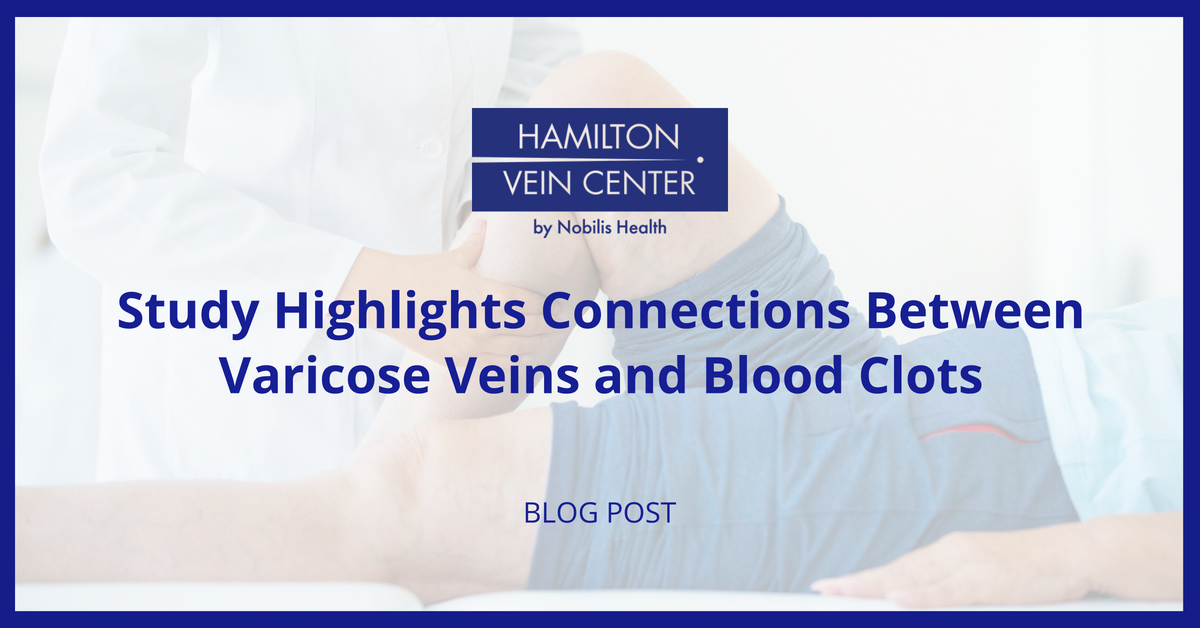Study Highlights Connections Between Varicose Veins And Blood Clots

Problems More Than Skin Deep
In most cases, varicose veins are seen as more of an inconvenience and aesthetic problem; they’re uncomfortable and unsightly, but, the thinking goes, they’re not going to be life-threatening. Unfortunately, as a recent study published in the Journal of the American Medical Association further underscored, the presence of this condition leads to a highly-elevated risk of developing dangerous blood clots in the form of deep vein thrombosis (DVT). [1]
The dangers of DVT can’t be understated. It’s especially dangerous when blood clots in lower limbs actually break off and travel up to the lungs or the heart. In extreme, untreated cases, this can be fatal. Clearly, then, varicose veins should not be taken lightly. Given how grave the situation can be, it’s important to take a closer look at this study and what it means for those with blood circulation disorders.
Correlation vs. Causation
Under the direction of Dr. Shyue-Luen Chang of the department of dermatology at Chang Gung Memorial Hospital in Taoyuan, Taiwan, a team of researchers recruited a large research pool of over 425,000 participants, about half of whom had varicose veins. Using medical records from 2001 to 2014, they noted that those with this vein condition were 5.3 times more likely to develop DVT. [1] In addition, somewhat less robust but nonetheless prominent connections were found between clots in the lung (PE) and narrowing of arteries in the legs (PED).
With the nature of this study—as well as the current state of research on the topic—Dr. Chang and the team couldn’t quite isolate varicose veins as the cause of DVT. Rather, they could only point to a correlation between the two conditions: those with the former were more likely to have the latter. “Not much is known about varicose veins and the risk of other diseases,” Chang conceded, adding that “[e]lucidating potential associations between varicose veins and health-threatening diseases is important.” [1]
Certainly, then, future work will build from these results and tease out the exact nature of this relationship.
Monitoring & Care
Nonetheless, this is a significant and notable spike. It should raise red-flags for any of the 23 percent of adults who suffer with this disease. As Dr. Chang put it, this means that “Patients with varicose veins may warrant careful monitoring and early evaluation.” [1] While researchers continue to figure out what factors make varicose veins a risk-factor of DVT, it’s important for those with this condition to be proactive and vigilant. Not only that, doctors need to be responsive and appreciate the potential dangers of this disease.
Even if the case is non-lifethreatening, There are plenty of reasons to be guarded and careful about varicose veins. To a degree that’s often unappreciated, the discomfort and unsightliness caused by this condition can have a serious impact on quality-of-life. If you’re not feeling your best—and if you’re embarrassed by the looks of your legs—you’re not going to be your best.
Furthermore, you also want to do your best to avoid putting yourself in serious risk or danger. In the same way that you’re better off getting car or home repairs done sooner rather than later, the earlier you’re able to take on varicose veins, the better off you’ll be. Whether your case is the sign of major trouble or just a major annoyance, getting help is the right thing to do.
If you’re suffering with varicose veins or any other circulation condition, the team at Hamilton Vein Center is ready to help. These experts employ nothing but the latest in techniques and technologies to ensure positive outcomes for their patients. Learn more about what this Texas-based team does by calling its Houston office at (281) 565-0033, the Austin location at (512) 551-1403, or San Antonio at (210) 504-4304 today!
References
- Reinberg, Steven. 2018. “Varicose Veins Tied To Higher Odds For Blood Clots”. Consumer Healthday. https://consumer.healthday.com/cardiovascular-health-information-20/varicose-vein-news-691/varicose-veins-tied-to-higher-odds-for-blood-clots-731453.html.